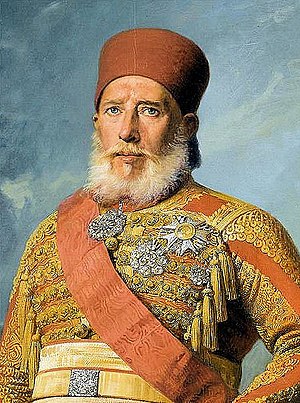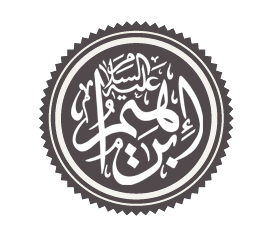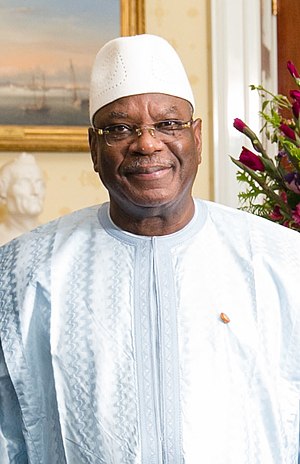Discover Your Roots
SIGN UPDiscover Your Roots
SIGN UPIbrahim is a male name of Arabic origin, meaning "Father Of Nations." It is derived from the renowned figure Ibrahim (Abraham) in Islam, known for his virtues and significance in religious scriptures. The name Ibrahim is associated with strength, leadership, and the potential to create a lasting impact. In addition to its cultural and religious significance, Ibrahim has been utilized in various contexts, including literature and awards such as the Ibrahim Prize for Achievement in African Leadership. The name also holds connections to a surah of the Qur'an and a tragedy by Elkanah Settle. Furthermore, Ibrahim may be linked to related names and terms, such as Ibrahimzai and Ibrahima, highlighting its cultural and linguistic diversity.

Ibrahim Pasha (1789 – 10 November 1848) was an Egyptian general and politician, known for his military prowess and leadership during his time. As the eldest son of Muhammad Ali, the Ottoman Wāli and unrecognized Khedive of Egypt and Sudan, Ibrahim played a significant role in the Egyptian and Ottoman armies. He first took command of the Egyptian forces as a teenager and later became the effective ruler of Egypt and Sudan, as well as other dominions under Egyptian rule, such as Syria, Hejaz, Morea, Thasos, and Crete. Ibrahim's impressive military victories, including defeating the Ottoman Empire, solidified his place in history. Despite his untimely death, Ibrahim remains one of the most celebrated members of the Muhammad Ali dynasty, honored for his military achievements. His legacy is preserved through a prominent statue in Egypt's capital, Cairo.Born in the village of Nusratli, near the town of Drama, Ibrahim showed early promise in military leadership. His training under his father's rule, introduction of European discipline into the army, and his successful campaigns against the House of Saud and operations in the Morea, further enhanced his reputation as a formidable military leader. Ibrahim's significant contributions to Egyptian and Ottoman history continue to be revered, and his impact on shaping the region's military and political landscape remains a vital part of his enduring legacy.

Ibrahim, also known as Ibraheem in Arabic, is a revered figure in Islam as the prophet and patriarch Abraham. In the Quran, he is recognized as one of Allah's messengers. The name Ibrahim is commonly used as both a first name and a surname among Muslims and Arab Christians, and it is a cognate of the name Abraham in Judaism and Christianity. In the Levant and Maghreb regions, diminutives like Brahim and Barhoum are often used for the first name Ibrahim. Throughout history, various notable individuals have borne the name Ibrahim, including Ibrahim Abboud, who served as the President of Sudan, and Ibrahim Lodhi, the Sultan of the Lodi Empire. In contemporary times, Ibrahim Abouleish, an Egyptian scientist, and Ibrahim Afellay, a Dutch footballer, have brought recognition to the name Ibrahim in their respective fields. The name, with its rich historical and cultural significance, continues to be a symbol of identity and heritage for many.

Ibrahim Boubacar Keïta, also known as IBK, was a prominent Malian politician who held various significant positions in the country's government. Born in Koutiala, Mali, Keïta was a descendant of the Keita princes of the Empire of Mali and a relative of Mali's founding father, Modibo Keïta. He pursued his education in prestigious institutions such as the Lycée Janson-de-Sailly in Paris and the University of Dakar, where he obtained a master's degree in history and postgraduate degrees in political science and international relations. Keïta's political career began when he became involved in the Alliance for Democracy in Mali (ADEMA-PASJ) and later served as Mali's prime minister from February 1994 to February 2000. After founding the centre-left political party Rally for Mali (RPM) in 2001, Keïta was elected president in the 2013 presidential election and reelected in 2018. However, his presidency was cut short when he was forced to resign in the 2020 Malian coup d'état. Despite the challenges and controversies he faced during his political journey, Ibrahim Boubacar Keïta left a lasting impact on Mali's political landscape and governance.

Ibrahim Adeer, also known as Ibraahin Adeer, was a prominent Somali ruler who played a significant role in the establishment of the Sultanate of the Geledi and the Gobroon dynasty. In the late 17th century, Adeer, a former Ajuran general, unified the Maay speaking people, Digil & Mirifle clans through both military and diplomatic efforts. He successfully led the Geledi tribe to push back the imperial Ajuran army, expanding his influence across large parts of the Horn of Africa. His military prowess was evident as he repeatedly defeated the Ajuran army in various battles, ultimately conquering half of the Ajuran Empire. Ibrahim Adeer's legacy was continued by his son, Mahamud Ibrahim, who succeeded him as the ruler of the Geledi Sultanate. His remarkable achievements have been chronicled in historical works such as "Somali Sultanate: the Geledi city-state over 150 years" by Virginia Luling. Ibrahim Adeer's contributions to Somali history and his role in shaping the region's political landscape have left a lasting impact.

Ibrahim Bushati, also known as Ibrahim Bushat Pasha, was a prominent figure from the Bushati family in Ottoman-controlled Albania. He held the title of Beylebey of Rumelia in 1805 and played a role in suppressing the First Serbian Uprising under Karađorđe Petrović. Ibrahim Bushati was closely associated with Ali Pasha and even commanded Ali Pasha's sons, Muktar Pasha and Veil Pasha, in 1806. His tenure in Shkodër was marked by significant turmoil, particularly following the events of the First Serbian Uprising. Throughout his rule, Ibrahim Bushati maintained a close relationship with the Ottoman Empire until his passing in 1810. Following his death, he was succeeded by Mustafa Reshit Pasha. Ibrahim Bushati's legacy is an integral part of the historical narrative of the region, and his contributions continue to be the subject of scholarly research and discussion.
All images displayed on this page are sourced from Wikipedia or Wikimedia Commons.We use these images under their respective Creative Commons or public domain licenses. Wherever applicable, author attributions and license information are provided. If you believe an image is used incorrectly or outside its license terms, please contact us so that we can review and correct the issue.